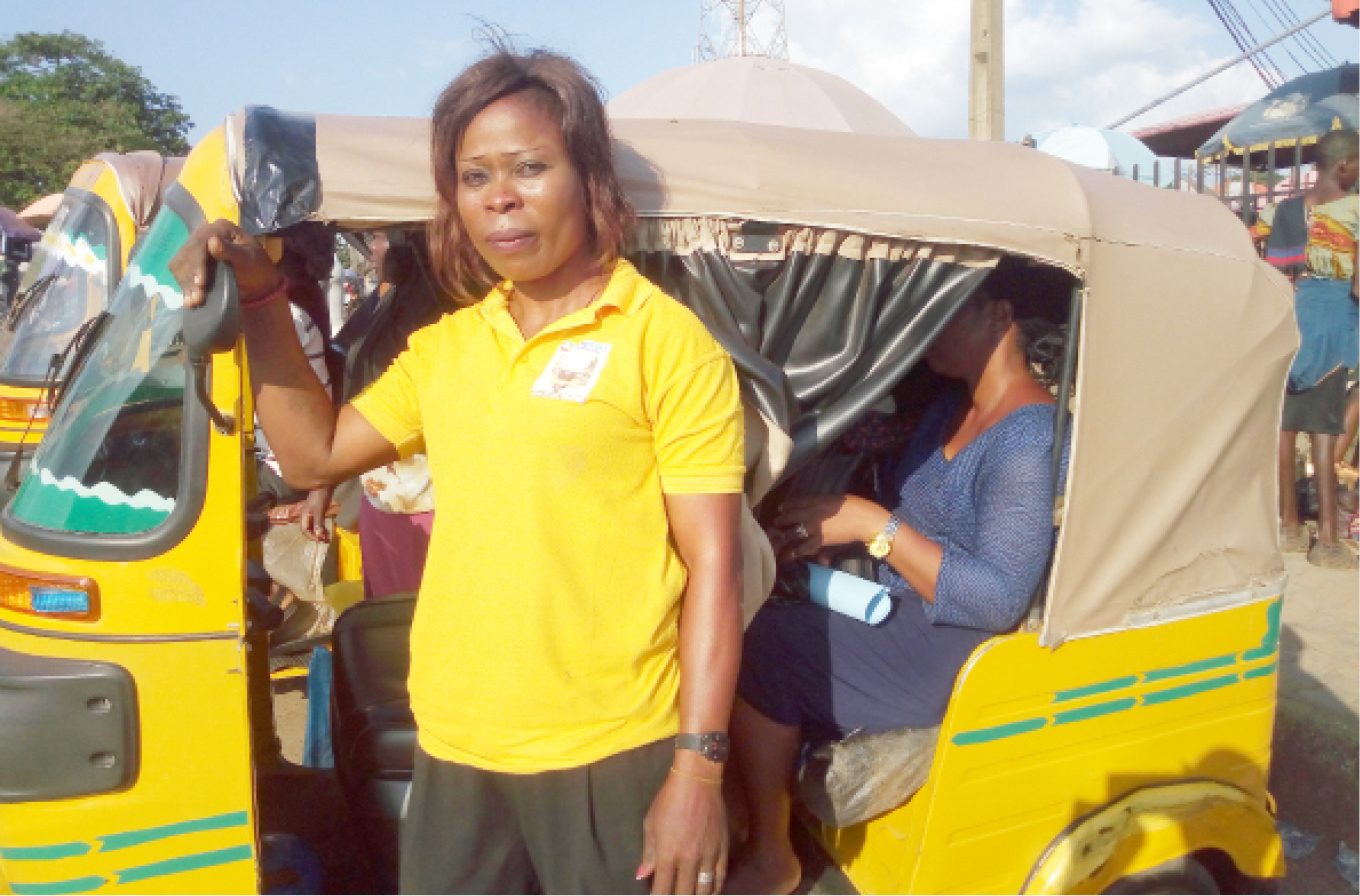I used to ride ‘keke Napep’ from Ekiti to Ibadan, Lagos – Female commercial tricyclist
She is touted as the first female commercial tricycle rider in Ado Ekiti. Widely in the Ekiti State capital, fellow riders of the keke Napep (as the commercial tricycle is locally known), and even her passengers, fondly call Mrs Bola Adeomi the ‘First Lady’. A quinquagenarian and mother of four children, Adeomi told Eko Trust […]

Mrs. Adeomi, a tricyclist
She is touted as the first female commercial tricycle rider in Ado Ekiti. Widely in the Ekiti State capital, fellow riders of the keke Napep (as the commercial tricycle is locally known), and even her passengers, fondly call Mrs Bola Adeomi the ‘First Lady’.
A quinquagenarian and mother of four children, Adeomi told Eko Trust she decided to take to the commercial tricycle business after she lost her husband nine years ago. A hairdresser by training, she spoke of how she had to take the tricycle bull by its horn when the challenges of life overwhelmed her.
She said, “What compelled me then to start riding keke Napep was that apart from the fact that my husband was dead, my children were very young and I had been left alone to take care of them. I told myself that instead of following men about, most of whom you could not really trust to assist you in all sincerity, I would rather dare the keke Napep business, which is a rarity for women in Ekiti.
“Now, if I am told to ride a tricycle to Abuja, I can. I have ridden a tricycle to Lagos and Ibadan. It was when the Federal Road Safety Corps said we should be using a plate number that I decided not to be going such long distances again. I wouldn’t want any embarrassment from policemen who would want to take advantage of my gender to penalise me.”
How did Adeomi take off after she had decided to venture into the commercial tricycle business? Without any money of hers and riding experience, going into the business was initially a tough nut. At her wits end, she cast shame and shyness aside and approached the Ekiti State chairman of the Tricycle Riders Association, Mr Talabi Akinola, with stories of her plight and intention.
According to her, it was a startled Mr Akinola who asked her if she could even ride a tricycle at all after she told him she wanted one.
She answered no but assured him she would learn in no time only if he would teach her.
He did, and a new Adeomi emerged.
Adeomi said, “I thank God that since I learnt how to drive the Keke Napep, God has blessed me with good things on the job. The state chairman made it possible for me to have a tricycle then.
“We are about 40 to 50 riders on this Post Office to Omisanjana route, but not every one of us has a tricycle. We get tricycles on instalment from the seller after putting down some money, and then offset the remaining cost over time as agreed with the seller.
“The tricycle I am presently using is not my own. But using it is better than just sleeping lazily at home. At the end of the day, I get something daily for myself.”
Her own tricycle, Adeomi narrated, had been crashed in an accident she was involved in a few years ago opposite Bawa Estate, Ado-Ekiti. She showed the Eko Trust correspondent a mark on her face, which she said she got from the accident.
“Since then, I have been hustling. I have written a letter to the office of Erelu Bisi Fayemi, wife of the governor of Ekiti State. I am still expecting a call or message from there. I don’t know who can take me to Erelu Bisi Fayemi so I can plead with her to help me,” she said.
According to her, the accident and her consequent financial condition rendered her unable to send her children to higher institutions.
“My daughter had to settle for tailoring but I don’t even have the means to buy a sewing machine for her,” she lamented.
Adeomi called on philanthropists, politicians and the state governments to assist tricycles operators, especially ladies, in the state to own their own tricycles.
“If I have one tricycle, I will be able to bring in, at least, another lady to the fold. We will be solving unemployment that way and also taking girls who could be prostitutes because of hunger off the streets,” she said.
